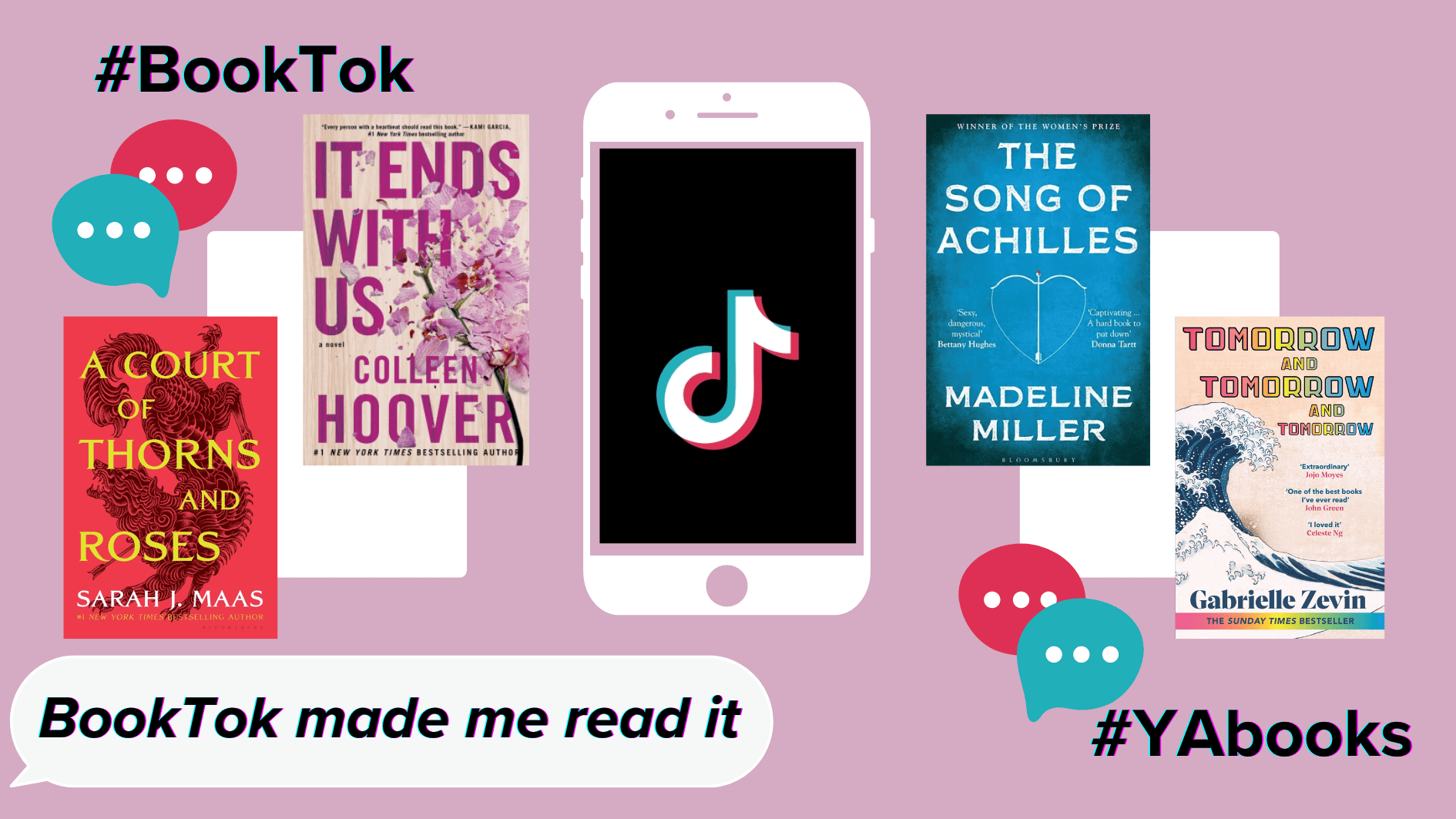‘BookTok’, the bookworm subculture of TikTok, has taken the literary and publishing world by storm—but has it been for better or worse? Charlotte Fielding delves into the world BookTok and its influence on the wider reading landscape.

BookTok is a literary phenomenon. Depending on who you ask, it has either been credited with saving literacy and book publishing or destroying it, and arguments are frequently made for both cases. BookTok—TikTok’s bookish subculture—has jumpstarted author careers, connected fandoms, increased many users’ reading habits, and led to the manifestation of ‘I saw it on Booktok’ tables in bookshops.
The hashtag #booktok currently has over thirty million posts, and although TikTok has recently stopped showing view counts for hashtags, by September 2023 it had already reached nearly two hundred billion views. One of the most popular genres on BookTok is Young Adult, particularly fantasy.
In fact, the hashtag #yabooks has 412k posts, just beating #fantasybooktok at 411k. Romance is still the winning genre, with 2.1 million posts under #romancebooks, but both genres beat my personal favourite #literaryfiction, which has only 22k posts.
Depending on who you ask, [BookTok] has either been credited with saving literacy and book publishing or destroying it
This strong preference for fantasy, romance, and YA comes as no surprise. Although plenty of millennials—and older folks—have also discovered the allure of short-form video, the TikTok demographic skews young. Two-thirds of TikTok users are between 18-34 years old. Interestingly, Publisher’s Weekly reports that just over half of YA purchases are made by people between the ages of 30 and 44, with most of those reporting that they plan to read the books themselves, rather than give them to someone younger. This age group is the next-largest TikTok demographic.
One of New Zealand’s biggest BookTokkers, Aaliyah (@aaliyahreads) has 225k followers, which is huge for a New Zealand creator, and says her favourite genre is YA fantasy.
Many YA authors have joined TikTok to connect with fans and promote their work. Big names like John Green, Victoria Aveyard, and Brandon Sanderson all have large followings on TikTok. New Zealand authors on TikTok don’t have the reach that overseas authors do, but there are plenty of us on there, carving out our own corners of BookTok and connecting with readers and other authors (plenty of overlap in that Venn diagram). Bookworms love to talk books, and BookTok helps facilitate a sense of culture and identity within the reading community.
Many YA authors have joined TikTok to connect with fans and promote their work
So has BookTok really helped with literacy rates and with ‘saving the publishing industry’? According to WordsRated, BookTok contributed directly to around 20 million book sales in 2021. While this is a staggering number to credit to one social media platform, it’s worth bearing in mind that it was around 2.4% of total book sales. Significant, but not single-handedly saving publishing. The YA segment, while still small, is recording the biggest growth. The share of YA book sales has increased by over 34% since 2018.
Perhaps more significantly, 48% of TikTok users in the United States reported reading more books than they had before BookTok. End of year reading wrap-ups feature BookTokkers talking about their favourite books of the year. Some read massive numbers of books, over 200 a year. I read anywhere from 40 to 70 books a year and consider myself a fairly big reader.
A whopping 62% of TikTok users—again from the US, it’s hard to find equivalent stats for New Zealand—said they have read at least one book based on a recommendation from BookTok. The format of TikTok enables anyone who has just finished a book and desperately wants to talk about it to make a video and connect with others who love it—or hate it, as the case may be. There is less of an expectation for aesthetics, as there is on Bookstagram, Instagram’s equivalent: enthusiasm and authenticity usually garners more reach and engagement on TikTok.
48% of TikTok users in the United States reported reading more books than they had before BookTok
As someone who spent their childhood and adolescence with my nose stuck in a book as often as I could, I often wished for this kind of reading community. It didn’t exist back when I was a teen, and I sometimes still find myself wanting to talk about books that I read back then, everything from Clan of the Cave Bear to Northern Lights to Great Expectations. It makes sense to me that people are reading books and jumping online to talk about them, and then seeing more recommendations, and reading them, and then going online to add to the conversation surrounding those recommendations.
This ouroboric hype has led to some criticism of BookTok, with a backlash against popular ‘BookTok books’. Take Colleen Hoover’s It Ends With Us, which became a runaway success when it was propelled to the top of the bestseller charts for many weeks in 2021 (after becoming a ‘BookTok book’), and bringing the rest of her catalogue in its wake. Not bad for a book originally published in 2016 with limited uptake.
Sarah J Maas is another massive author on BookTok. She was not a new author, but her fantasy series, which starts with A Court of Thorn and Roses, soared to bestseller lists, largely due to their popularity on BookTok. The ACOTAR series is marketed as YA, despite containing raunchy sex scenes, often referred to as ‘fairy smut’.
People also complain that books are often talked about only in terms of easy-to-market tropes…rather than what the actual story is about, or what the writing is like
As popular as these books are, there are just as many people saying they are absolute trash and barely readable, and that they are bringing literacy levels down. I haven’t read either author, so I can’t claim a side on this one, but reading is reading, even if the writing isn’t the best quality. People also complain that books are often talked about only in terms of easy-to-market tropes, such as ‘only one bed’, ‘enemies to lovers’, or ‘the chosen one’, rather than what the actual story is about, or what the writing is like.
Often there are complaints that the same books are being pushed repeatedly on BookTok, and while there are some books that are frequently mentioned, there are many nuanced discussions about a wide range of popular and more niche books.
There are some popular BookTok books I love. Two that spring to mind are The Song of Achilles by Madeline Miller, which I read before joining BookTok, and Tomorrow and Tomorrow and Tomorrow by Gabrielle Zevin, which was one of my top reads of 2022. Again, The Song of Achilles was published years before TikTok was even created, and enjoyed a renaissance thanks to its BookTok popularity. Neither of these are YA books, but they are certainly being read and discussed by young adults.
While BookTok can be a wonderful place, it is an unmoderated online space
While BookTok can be a wonderful place, it is an unmoderated online space, which can be a problem. Some months ago, a teenage boy—somewhere between 14 and 16, I don’t recall exactly—posted a video looking for recommendations for dystopian fiction. He had enjoyed The Maze Runner and The Hunger Games, and wanted more in that vein.
Unfortunately, a bunch of adults jumped in the comments section recommending the book Haunting Adeline. Haunting Adeline is marketed as a dark romance, but it has multiple scenes of sexual abuse and other issues including stalking. I haven’t read it, but people who have say it should be classed as a horror, or simply as dark fiction, because it is not romantic and needs many trigger warnings. It is adult only. It is not the sort of book that should be recommended to a boy looking for YA dystopia. It’s almost like the commenters on that video ignored his age and genre and simply latched onto the dark aspect, but there is a vast difference between dystopia and dark ‘romance’.
The video has since been deleted, but it’s a useful reminder that even spaces dedicated to books can be unsafe for children. Going back to Sarah J Maas’ books, while they have an overall positive depiction of sex, there are also scenes with non-consent, and relationships with somewhat ambiguous morals that may be hard for younger readers to sort through.
Despite these potentially negative or harmful influences, BookTok is overall a wholesome and invigorating community to be a part of.
I have been around long enough to see authors go from a handful of followers to scoring traditional publishing deals off the back of the buzz they’ve generated for themselves, like Andy Darcy Theo, a British-Greek Cypriot BookTokker whose debut YA fantasy novel, The Light that Blinds Us, is coming out with Simon and Schuster this month.
Despite these potentially negative or harmful influences, BookTok is overall a wholesome and invigorating community to be a part of
It’s also a place where self-published authors can reach potential readers directly, and it can lead to significant sales when a video goes viral. Authors share their writing and publishing journeys, making it more accessible for others following along these paths. There are plenty of teenagers on there talking about the books they are writing, or dream about writing.
BookTok—like the rest of TikTok—is what you make of it. The highly tuned algorithm of the FYP (the ‘for you page’, where users scroll to discover new content) means that if you like something, you’ll see more of it. For those interested in YA and children’s literature, there’s a whole world of book-focused discourse and bookish joy to take part in. Reading and being in online spaces are not mutually exclusive—the digital world of BookTok is in cahoots with reading, not in opposition to it.

Charlotte Fielding
Charlotte Fielding is a writer who lives in Wellington with her son and dog. You can find her talking about books and writing on TikTok, exploring history, art, and culture on Substack, or at girlgotwords.com.



